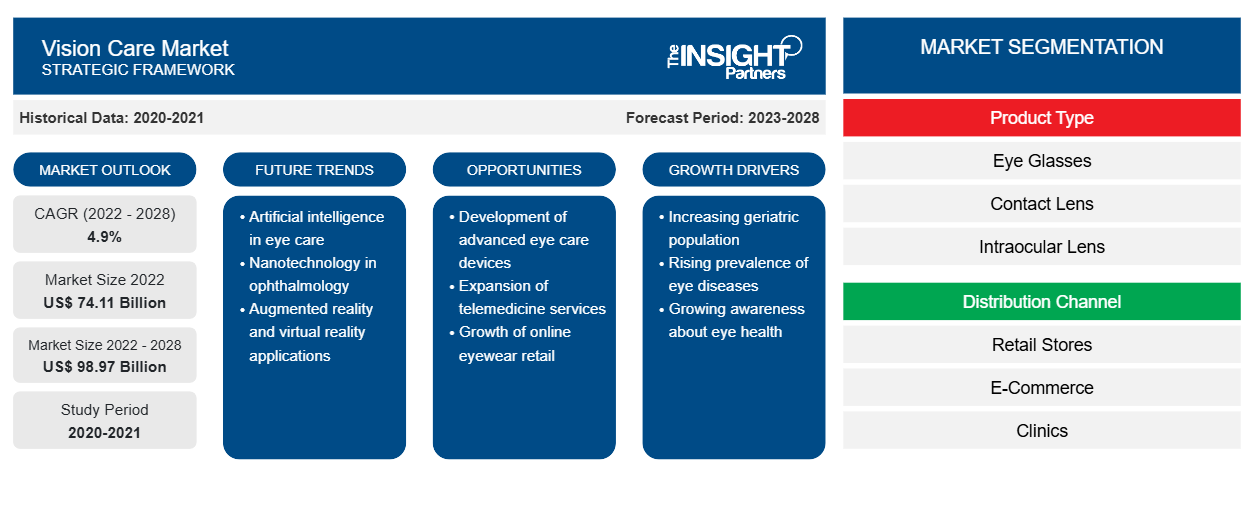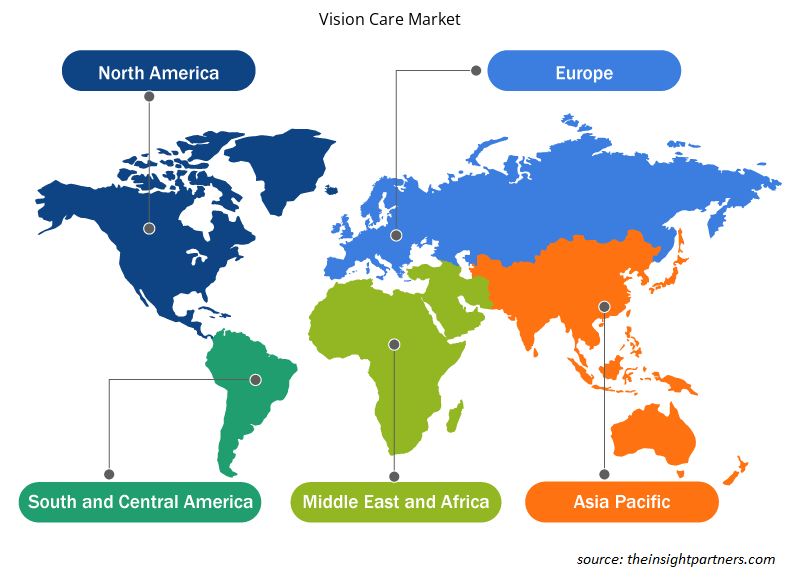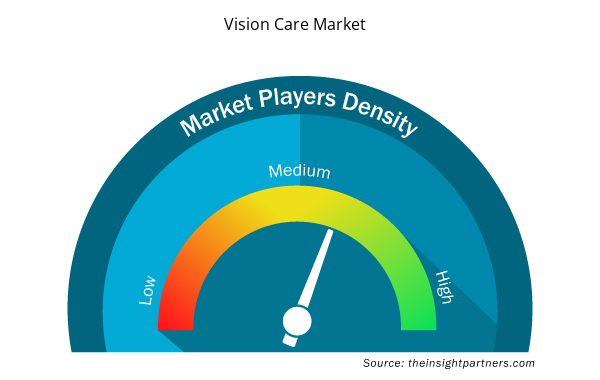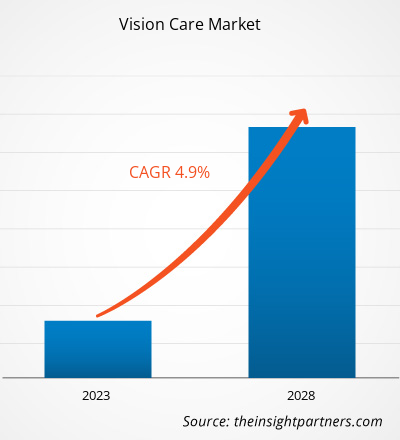The vision care market is expected to grow from US$ 74,110.14 million in 2022 to US$ 98,968.42 million by 2028; it is estimated to register a CAGR of 4.9% from 2022 to 2028.
Vision care products include eyeglasses contact lenses, intraocular lenses, contact lens solutions, eye drops, and others. The increasing prevalence of eye disorders boosts the development of advanced vision care products. Also, the rising number of vision care awareness programs trigger the adoption of vision care products worldwide.
Market Insights
Growing Prevalence of Eye Diseases Drives Vision Care Market Growth
A wide variety of eye diseases, including cataracts, glaucoma, and refractive errors, are prevalent across the world. According to an article published by the World Health Organization (WHO) in 2022, ~2.2 billion people in the world have a near vision impairment or a distance vision impairment. The leading causes of vision impairment are cataracts (~94 million cases) and uncorrected refractive errors (~88.4 million cases). The other causes of vision impairment are glaucoma, corneal opacities, diabetic retinopathy, and trachoma with ~7.7 million, 4.2 million, 3.9 million, and 2 million cases, respectively. According to data provided by the Centers for Disease Control and Prevention (CDC), ~12 million people in the US, aged 40 and above, suffered from vision impairment in 2022, out of which 3 million had vision impairment after correction and 8 million suffered from vision impairment due to uncorrected refractive index. The increasing incidences of diabetes and other chronic diseases are responsible for such a high prevalence of vision impairment in the US population. According to the results of the Canadian Health Measures Survey conducted over 2016–2019, 50.4% of adults aged 40–64 and 71.6% of seniors aged 65–79 indicated they had visited an eye care professional in the past year. Moreover, per the Royal National Institute of Blind People in 2021, in the UK, ~2 million people were living with vision loss. In 2021, the count of blind or partially blind people was recorded at ~340,000 in the UK. According to the data provided by the Government of India, ~57 lakh cataract surgeries were conducted in 2021–2022, whereas ~36 lakh cataract surgeries were carried out in 2020–2021.
Further, the increasing age of populations and workforces in different countries, and the increased visual demands of modern occupations underline the impact of low vision and blindness on economies. Thus, a high prevalence of vision impairment and blindness in different parts of the world boosts the growth of the vision care market
Customize This Report To Suit Your Requirement
You will get customization on any report - free of charge - including parts of this report, or country-level analysis, Excel Data pack, as well as avail great offers and discounts for start-ups & universities
Vision Care Market: Strategic Insights

- Get Top Key Market Trends of this report.This FREE sample will include data analysis, ranging from market trends to estimates and forecasts.
You will get customization on any report - free of charge - including parts of this report, or country-level analysis, Excel Data pack, as well as avail great offers and discounts for start-ups & universities
Vision Care Market: Strategic Insights

- Get Top Key Market Trends of this report.This FREE sample will include data analysis, ranging from market trends to estimates and forecasts.
Increasing Awareness of Vision Care Offers Ample Opportunities for Market
In recent years, various measures and efforts have been taken to create awareness and educate people regarding eye diseases, prompting patients to access suitable medications and treatments for such conditions. In 2017, the National Eye Institute (NEI) in the US initiated “Write the Vision,” a new eye health awareness program, specifically for African-American consumers. Write the Vision offers monthly resources to a large number of organizations, allowing them to promote healthy vision, and prevent vision loss and blindness in the communities they serve. Per the National Eye Health Education Program, a part of the NEI, African-Americans are more prone to eye diseases. It can further lead to loss of vision, if not treated in time. Hence, the Write the Vision program was launched to increase awareness about eye health.
Sightsavers—an international nongovernmental organization—works in developing countries to treat and prevent eye diseases. A large population in India resides in rural areas, having limited or no awareness of eye ailments. Sightsavers aims to create awareness with its Rural Eye Health Programme, provide high-quality eye health services, and eradicate avoidable blindness in the rural population. In addition, the WHO launched the Universal Health Coverage and Eye Care: Promoting Country Action, an event to provide practical, step-by-step, guidance to support Member States of the WHO in planning and implementing the recommendations of the WHO’s World report on vision. The WHO launched this event with the goal to provide integrated people-centered eye care services. Thus, the rising number of such eye health awareness programs is creating growth opportunities for the vision care market.
Product Type-Based Insights
Based on product type, the vision care market is segmented into eyeglasses, contact lens, intraocular lens, and others. The eyeglasses segment held the largest market share in 2021 and the same is likely grow at the highest CAGR during the forecast period.
Distribution Channel-Based Insights
Based on distribution channel, the vision care market is segmented into retail stores, e-commerce, clinics, and hospitals. The retail stores segment accounted for the largest share of the market in 2021, and the e-commerce segment is expected to register the highest CAGR of 9.5% during the forecast period.
Vision Care Market Regional Insights
The regional trends and factors influencing the Vision Care Market throughout the forecast period have been thoroughly explained by the analysts at Insight Partners. This section also discusses Vision Care Market segments and geography across North America, Europe, Asia Pacific, Middle East and Africa, and South and Central America.

- Get the Regional Specific Data for Vision Care Market
Vision Care Market Report Scope
| Report Attribute | Details |
|---|---|
| Market size in 2022 | US$ 74.11 Billion |
| Market Size by 2028 | US$ 98.97 Billion |
| Global CAGR (2022 - 2028) | 4.9% |
| Historical Data | 2020-2021 |
| Forecast period | 2023-2028 |
| Segments Covered |
By Product Type
|
| Regions and Countries Covered | North America
|
| Market leaders and key company profiles |
Vision Care Market Players Density: Understanding Its Impact on Business Dynamics
The Vision Care Market is growing rapidly, driven by increasing end-user demand due to factors such as evolving consumer preferences, technological advancements, and greater awareness of the product's benefits. As demand rises, businesses are expanding their offerings, innovating to meet consumer needs, and capitalizing on emerging trends, which further fuels market growth.
Market players density refers to the distribution of firms or companies operating within a particular market or industry. It indicates how many competitors (market players) are present in a given market space relative to its size or total market value.
Major Companies operating in the Vision Care Market are:
- Alcon Inc
- Bausch Health Companies Inc
- Carl Zeiss AG
- Cooper Companies Inc
- Essilorluxottica SA
Disclaimer: The companies listed above are not ranked in any particular order.

- Get the Vision Care Market top key players overview
Companies in the vision care market adopt inorganic and organic strategies such as mergers and acquisitions. A few recent key market developments are listed below:
- In March 2022, Alcon Inc launched the Clareon family of IOLs in the US. Using Alcon’s most advanced IOL material, Clareon can deliver consistent visual outcomes and exceptional clarity that lasts.
- In January 2022, Alcon launched the DAILIES TOTAL1 for Astigmatism, the first and only Water Gradient contact lens for patients with astigmatism.
- In June 2022, CooperVision acquired EnsEyes, a leading supplier of orthokeratology (ortho-k) and scleral contact lenses in the Nordic region. The company will operate within the Cooper Vision Specialty EyeCare group.
- In February 2021, Johnson & Johnson Vision Inc. received CE Mark for its Acuvue Oasys multifocal contact lens with pupil-optimized design for European people. It will be used to treat patients with presbyopia.
Company Profiles
- Alcon Inc
- Bausch Health Companies Inc
- Carl Zeiss AG
- Cooper Companies Inc
- Essilorluxottica SA
- Johnson And Johnson Services Inc.
- Hoya Corporation
- Rodenstock Gmbh
- Menicon Co. Ltd
- Rayner Intraocular Lenses Limited
- Historical Analysis (2 Years), Base Year, Forecast (7 Years) with CAGR
- PEST and SWOT Analysis
- Market Size Value / Volume - Global, Regional, Country
- Industry and Competitive Landscape
- Excel Dataset



Report Coverage
Revenue forecast, Company Analysis, Industry landscape, Growth factors, and Trends

Segment Covered
Product Type, and Distribution Channel

Regional Scope
North America, Europe, Asia Pacific, Middle East & Africa, South & Central America

Country Scope
Argentina, Australia, Brazil, Canada, China, France, Germany, India, Italy, Japan, Mexico, Saudi Arabia, South Africa, South Korea, Spain, United Arab Emirates, United Kingdom, United States
Frequently Asked Questions
What are the restraining factors for global vision care worldwide?
The adverse effects of contact lens on eye health is expected to restrict the vision care market growth during the forecast period.
Who are the major players in vision care across the globe?
Alcon Inc, Bausch Health Companies Inc, Carl Zeiss AG, Cooper Companies Inc, Essilorluxottica SA, Johnson And Johnson Services Inc., Hoya Corporation, Rodenstock Gmbh, Menicon Co. Ltd, Rayner Intraocular Lenses Limited.
Which segment is dominating the vision care market?
Based on product type, the vision care market is segmented into eye glasses, contact lens, intraocular lens, and others. The eye glasses segment holds the largest market share in the year 2022 and will remain same during the forecasted year.
What are the driving factors for global vision care worldwide?
The factors driving the growth of vision care include the growing prevalence of eye diseases and development of innovative products.
Which region is dominating the vision care market?
The global vision care based on regions are segmented into North America, Europe, Asia Pacific, Middle East & Africa, and South & Central America. In 2022, North America held the largest market share. However, the Asia Pacific region is estimated to grow at the fastest CAGR of 5.5% during the forecast period.
What is Vision Care?
Vision care products include eye glasses, contact lens, intraocular lens, contact lens solution, eye drops, and others. Increasing number of eye disorders have led to the development of advanced vision care products. Also, increasing vision care awareness programs have increased the adoption of vision care products.
Trends and growth analysis reports related to Life Sciences : READ MORE..
The List of Companies - Vision Care Market
- Alcon Inc
- Bausch Health Companies Inc
- Carl Zeiss AG
- Cooper Companies Inc
- Essilorluxottica SA
- Johnson & Johnson Services Inc.
- Hoya Corporation
- Rodenstock GmbH
- Menicon Co. Ltd
- Rayner Intraocular Lenses Limited

 Get Free Sample For
Get Free Sample For